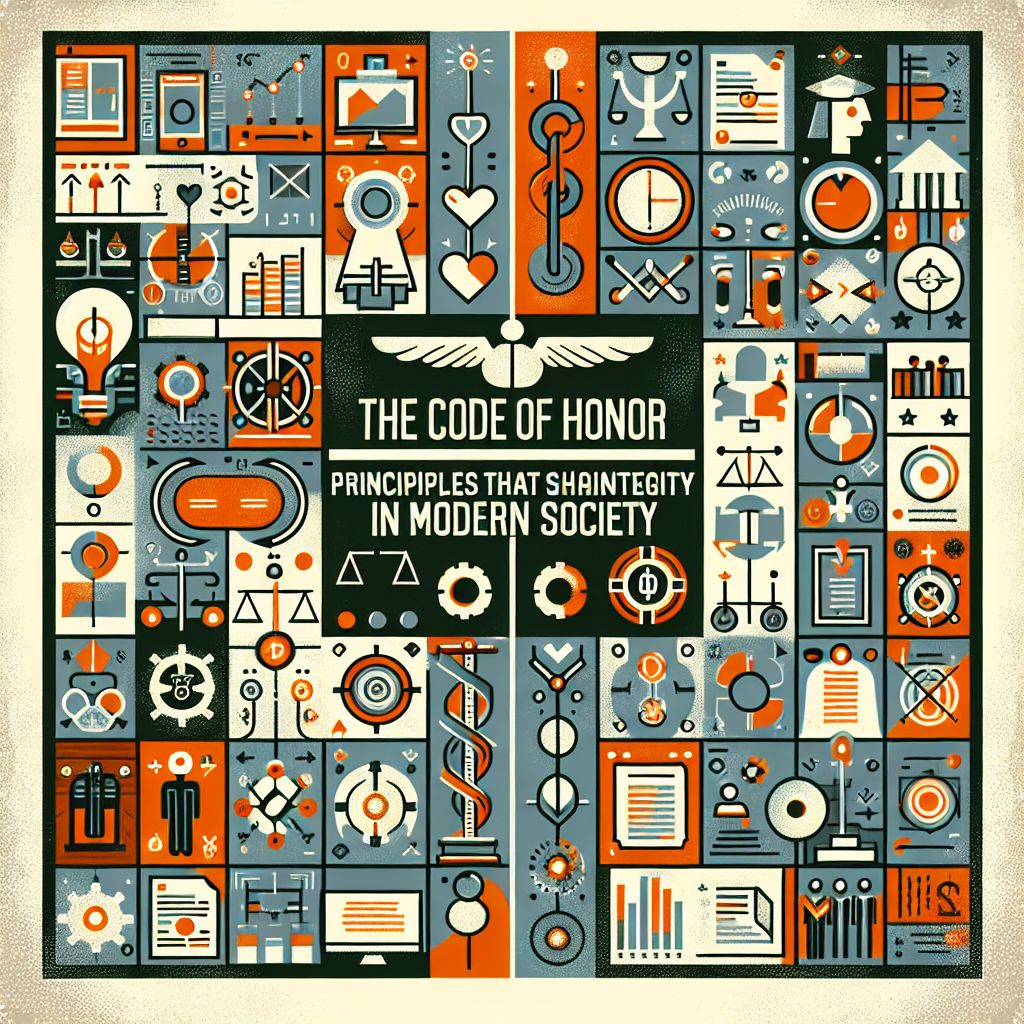In an era marked by rapid advancements in technology and increasingly complex social dynamics, the concept of a "Code of Honor" has emerged as a vital framework for navigating personal and professional landscapes. This code comprises principles that influence not only individual behavior but also the collective integrity of society. As we explore these principles, we will understand their significance and application in fostering ethical interactions, building trust, and maintaining societal cohesion.
The Foundations of a Code of Honor
A Code of Honor is fundamentally about upholding integrity, holding oneself accountable, and adhering to a set of core values that guide decisions and actions. Importantly, these principles can differ across cultures and communities, yet they often share overlapping themes, including respect, honesty, loyalty, and responsibility. Let’s delve into some of these essential principles.
- Respect for Others
Respect forms the bedrock of any honor code. In a society where individuals are often quick to judge or dismiss differing perspectives, fostering respect is crucial. This means acknowledging the dignity of others, actively listening to their viewpoints, and engaging with empathy. A culture of respect leads to constructive dialogue and diminishes conflict, enabling individuals to work cohesively towards common goals.
- Honesty and Transparency
Honesty is the cornerstone of integrity. In both personal and professional realms, truthfulness fosters trust. When individuals are open about their actions, intentions, and challenges, it cultivates an environment where collaboration thrives. In essence, honesty empowers individuals to take ownership of their mistakes, learn from them, and grow.
- Responsibility and Accountability
A commitment to accountability signifies a willingness to accept the consequences of one’s actions. In today’s world, where digital footprints can complicate issues of privacy and responsibility, being accountable becomes paramount. It encourages individuals to reflect on their choices and reassess their commitments. Adopting a responsible mindset leads to a more mature, ethical society that values integrity.
- Loyalty and Commitment
Loyalty extends beyond personal relationships; it encompasses loyalty to principles, communities, and institutions. This principle encourages individuals to act in the best interest of their families, friends, and organizations. However, loyalty should not blind individuals to unethical behavior; rather, it should be used as a foundation for promoting positive action and rejecting wrongdoing.
- Fairness and Justice
A well-rounded Code of Honor emphasizes the importance of fairness and justice. These values are crucial for societal stability and harmony. Individuals must advocate for equitable treatment, challenge discrimination, and foster inclusivity. Promoting fairness cultivates an environment where everyone feels valued and empowered to contribute.
The Role of the Code of Honor in Modern Society
In contemporary society, the Code of Honor plays a pivotal role in various domains, including business, education, politics, and community service. A strong code can help to shape ethical standards, encourage constructive interactions, and mitigate conflicts.
- In Business
In the corporate world, businesses that adhere to a Code of Honor often perform better. Companies that prioritize ethical practices, such as transparency, fair labor practices, and environmental responsibility, tend to foster stronger relationships with customers and employees alike. An ethical business reputation enhances brand loyalty and consumer trust, ultimately leading to long-term success.
- In Education
Educational institutions play a vital role in instilling a Code of Honor in young minds. By emphasizing principles such as honesty, respect, and responsibility, schools can help shape students’ ethical frameworks. When students embrace these values, they are more likely to become conscientious citizens who contribute positively to society.
- In Politics
Political integrity is essential for maintaining public trust. Political leaders who adhere to a Code of Honor can navigate the complexities of governance more effectively. By prioritizing transparency, accountability, and fairness, politicians can foster trust among constituents and create a political culture that encourages civic engagement.
- In Community Service
Community organizations often rely on a strong Code of Honor to galvanize volunteers and supporters. Such organizations are built on shared values, which facilitate cooperation and collaboration. When individuals feel connected by a mutual understanding of ethical principles, they are more likely to work together to tackle societal issues and uplift their communities.
The Challenges of Upholding a Code of Honor
While the principles underlying a Code of Honor are noble, adhering to them can be challenging in practice. Factors such as societal pressure, competitiveness, and misinformation can undermine individuals’ commitment to integrity. Furthermore, the digital age presents unique challenges, including the prevalence of fake news and social media’s ability to distort perceptions.
Cultivating a Culture of Honor
To overcome these challenges, individuals and organizations must take proactive steps to foster a culture of honor. Education and open dialogue are essential components. Workshops, mentorship programs, and ethical training can help reinforce the significance of integrity and prepare individuals to uphold these principles in real-life situations.
Moreover, individuals should critically assess their environments, seeking out mentors and role models who embody integrity. Celebrating ethical behavior within communities can also reinforce the importance of a Code of Honor, inspiring others to follow suit.
Conclusion
In an age where integrity is often tested, a well-defined Code of Honor remains a guiding light. By embracing and exemplifying principles such as respect, honesty, responsibility, loyalty, and fairness, society can cultivate an environment where integrity flourishes. As individuals strive to embody these values, they contribute not only to their own lives but also to the broader social fabric.
FAQs
1. What is a Code of Honor?
A Code of Honor is a set of ethical principles that guide individuals’ behavior and decision-making processes in personal and professional contexts.
2. Why is integrity important in modern society?
Integrity fosters trust, collaboration, and fairness, which are essential for maintaining healthy relationships and cohesive communities. It is foundational for effective communication and conflict resolution.
3. How can organizations implement a Code of Honor?
Organizations can implement a Code of Honor by establishing clear ethical guidelines, conducting training sessions, and promoting a culture of transparency and accountability.
4. What role do educational institutions play in promoting a Code of Honor?
Educational institutions can instill a Code of Honor by teaching students the importance of ethical principles, encouraging open discussions about integrity, and modeling ethical behavior among staff and administrators.
5. How can individuals uphold a Code of Honor in their daily lives?
Individuals can uphold a Code of Honor by practicing respect, honesty, and accountability in their interactions, actively seeking to make ethical choices, and surrounding themselves with others who value integrity.
It seems like you might be looking for a specific prompt or have a particular topic in mind. Could you please provide more details or clarify what kind of prompt you need? Whether it’s for writing, brainstorming, or something else, I’m here to help!, #Code #Honor #Principles #Shape #Integrity #Modern #Society, #Code #Honor #Principles #Shape #Integrity #Modern #Society, 1736691415, the-code-of-honor-principles-that-shape-integrity-in-modern-society




![Read more about the article Unpacking the Lyrics: What [Song Title] Says About Love and Loss](https://karkafi-ben.com/wp-content/uploads/2025/01/1736658964-768x768.png)
![Read more about the article Karmen: The Rising Star Redefining [Industry/Field]](https://karkafi-ben.com/wp-content/uploads/2025/01/1736658990-768x768.png)